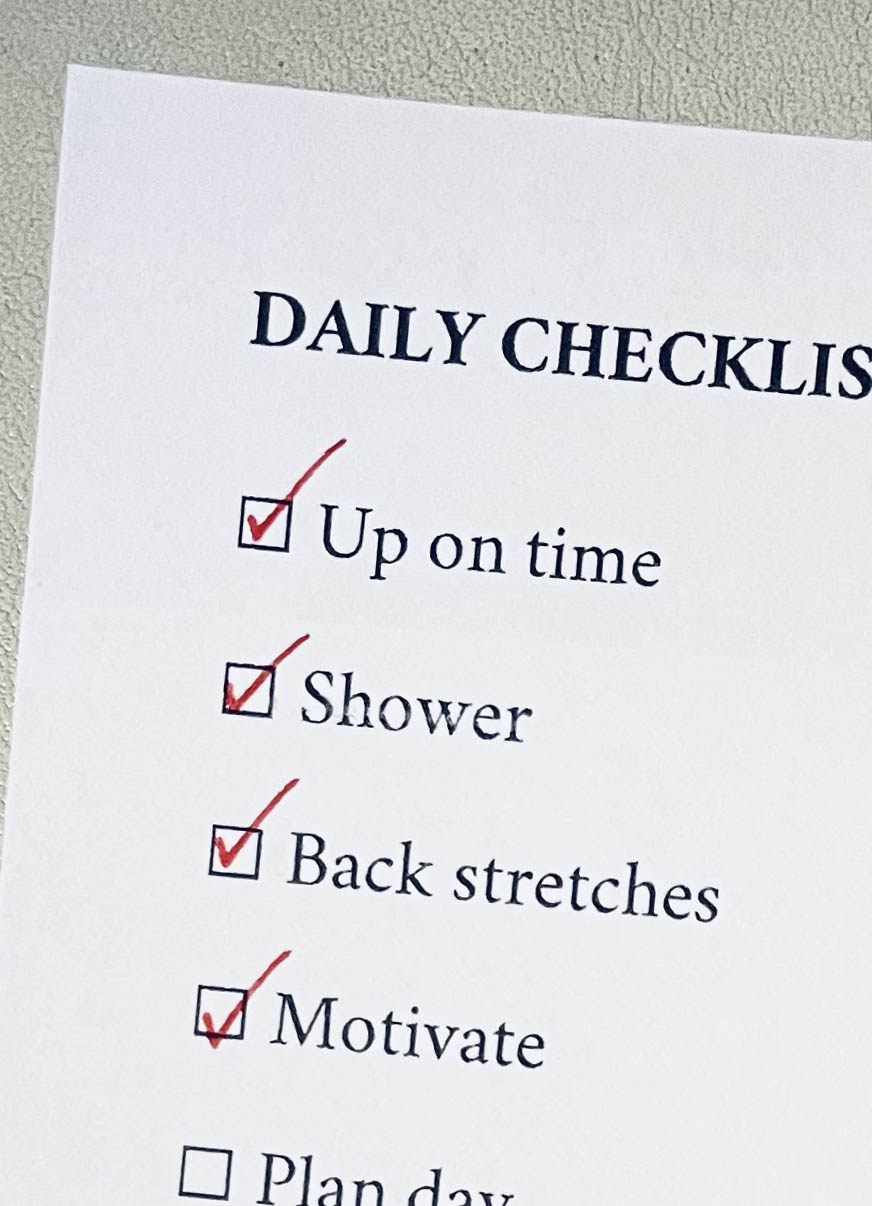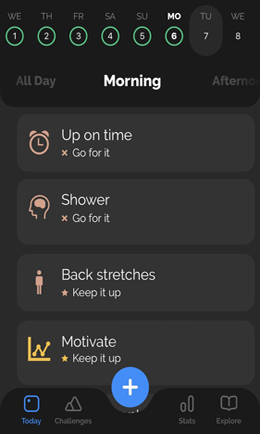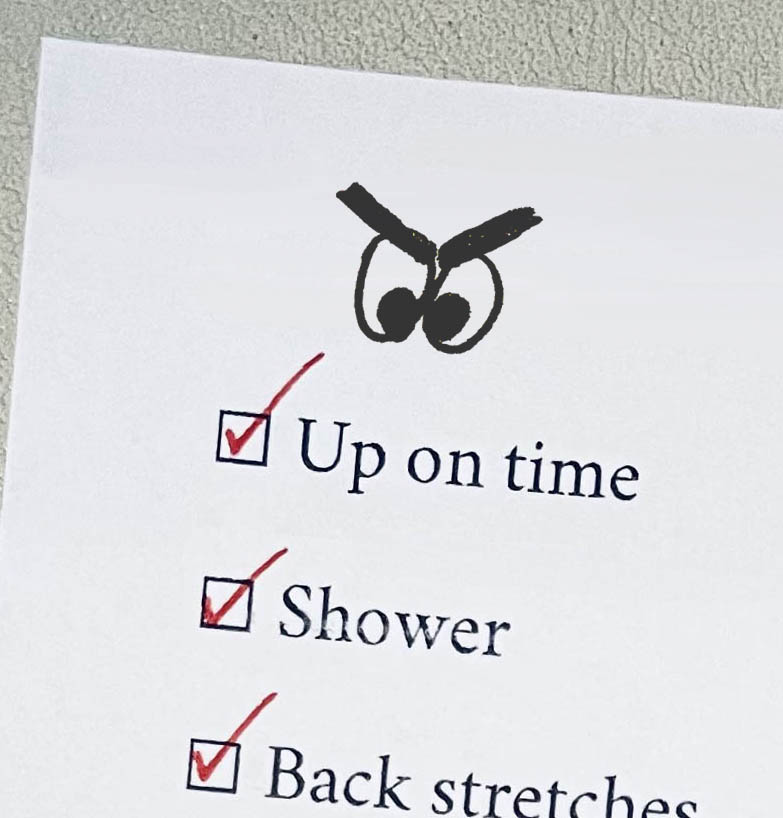Ordering yourself around with an app
post by bfinn · 2021-12-07T00:49:11.546Z · LW · GW · 2 commentsContents
2 comments
It's hard to make yourself do tiresome tasks. You will if your boss tells you to, and asking someone else to nag you can also help. But, oddly, a mere app can also order you around and make you do things, when willpower and plain task lists fail. Because, I will argue, apps can seem like people.
There's a bunch of things I ought to do every day, such as planning, eating healthily, and exercise, but I often forget or procrastinate the more tedious ones. So for years I've tried to force myself to do them via checklists, using software like Microsoft Word, or even pen & paper.
But these attempts at discipline rarely lasted. Despite initial determination to complete the checklist daily, excuses and exceptions would soon pile up, then I'd forget even to look at it, and not long after would abandon the whole idea. Only to try again months later.
However, I had a breakthrough a couple of years ago, when I switched from checklists on paper or generic software, to a dedicated app. (Specifically Productive, which is simple yet functional, though there are many alternatives.)


As soon as I started using the app, it felt like it was telling me to do the tasks, rather than me telling myself in Word or on paper. While there was no functional difference - the checklist was identical, and I didn't use alarms, notifications or other reminders - suddenly I found myself completing it. And I've used the app every single day since. While I don't always finish the list, I do at least consider each item, and check off those I've done.
Some people use an 'accountability partner', such as a friend, to nag them to get work done. It might seem the friend's role is redundant, merely telling them to do things they already know they should. But by involving someone else, you add an extra punishment for failure: the shame of failing in your friend's eyes; of letting them down, as well as yourself. Similarly, while many people pay personal trainers and music teachers to instruct them, many use them merely to create pressure to work out or practice.
And while I'll incur no shame from Productive if I fail, it seems I still feel some of the same social pressure, as if it were a person. It’s strange that a puny app can order us around, when we know it can’t punish us, and doesn’t even care.
Tim Urban wrote how procrastination comes from treating Past You, Present You and Future You as distinct people. Past You decided to overcommit Present You with a load of tasks, much to your annoyance; but Present You can delegate them to the highly effective Future You, and play games instead. A similar dynamic is at work here: the checklist was written by Past Me, who Present Me often ignores. But if I replace Past Me with a Non-Me - the app - it seems I'm more likely to obey, and do the tasks rather than procrastinate them.
This also reminds me of Julian Jaynes' controversial bicameral mind hypothesis, which claims that until a few thousand years ago, humans didn't have a stream of consciousness. On the rare occasion when a thought popped into someone's head, they wouldn't realize it was their own, but treated it as a command from a god, and obeyed it unquestioningly. (Remnants of this are supposedly found in schizophrenia and hypnosis.)
So if you make your to-dos feel like they come from someone else, maybe you'll obey them too. And if that someone else is a computer, then making it seem more godlike, or at least human and authoritative, should help. This is partly why endangered aircraft warn pilots with verbal alerts such as 'Pull up!' (in an urgent tone), not mere lights and sounds. Similarly, getting Alexa to give you spoken reminders - and ideally interrogate you about why you haven't done them - might work even better than an app.
In Thinking Fast and Slow, Daniel Kahneman reports that a picture of watching eyes in an office lunchroom will triple honesty box payments for coffee. Again, people will obey even a pretend god. The same trick might help you complete your tasks:

Why does Productive feel like a person, in a way that generic software or pen & paper don't?
As mentioned, I'm not using the app's notifications or alarms, which might make it seem alive, or at least would remind me to use it. Even so, Productive is not 100% passive. It still shows small signs of life, such as the encouraging messages in the screenshot ('Go for it'), and a further message and noise when you check off a task. Some apps try to gamify productivity, with prominent scores and stats, and more elaborate audiovisual rewards. As games are mainly social, these too might create the impression that other people are involved.
With Word or similar software, I have to spend a few seconds each morning resetting the checkboxes or re-printing the checklist. Whereas Productive does this automatically - another little sign of life. For the more you have to do to get your checklist, the more it feels like your own effort; the more automatic it is, the more it feels like there's another entity involved.
Another difference is the fact that I use Productive on a smartphone, and Word on a laptop. A smartphone is like a living thing, active rather than passive, which may affect how I feel about all the apps on it. And Productive uses unusual fonts, colours and icons for my checklist, so it doesn't look like I wrote it. Whereas Word is like a sheet of paper - a passive medium, on which anything I write feels like mine.
There could be other things going on too. Were the novelty and attractiveness of Productive, as well as its slight automation, just enough to tip me from failure to success? Perhaps, though I'd been motivated enough to try on and off for years previously, varying the checklist content as well as trying less ordinary software than Word (e.g. OneNote).
By the way, making your to-dos feel like they come from someone else is a special case of making your writing feel like it was created by someone else. This change of perspective helps authors edit their work more objectively, and there are various tricks to achieve it. Some get other people to read their drafts to them, so they're in someone else's voice. Others use tougher techniques, such as reading their work through binoculars from across the room, or writing it in a foreign language, then translating back. So - taking a leaf from Productive's book - next time you write something, try switching it into an unusual font, point size or colour, to help you read it objectively, as if written by someone else.
Thanks to Cat for helpful comments.
2 comments
Comments sorted by top scores.
comment by georget · 2021-12-07T16:24:57.421Z · LW(p) · GW(p)
I have, after years of running for exercise and enjoyment finally subscribed to a running app ( deciding to buy an Apple watch was a nudge as well). I committed myself to a 14 week training program in the app with guided coaching during the run and little sorts of at-a-way-to-go! silly badges, and I feel more enthusiastic about running than I have in years. Weird, huh?
comment by dkirmani · 2021-12-07T06:45:16.393Z · LW(p) · GW(p)
I very much relate to the cycle of adopting productivity systems and then developing antibodies to them. I'm glad you found a self-hack that works! However, I'm pretty disagreeable by nature, and loathe being told what to do. Maybe I should get a planner that tells me not to do the laundry, or else.